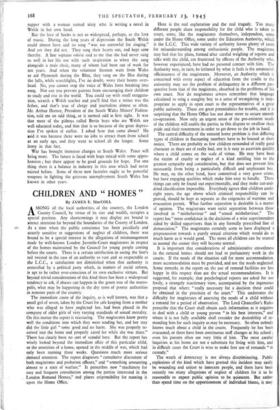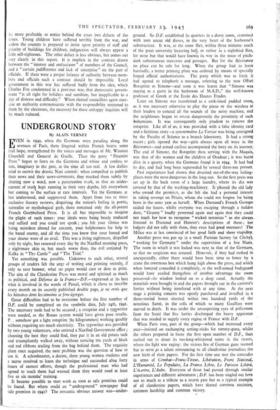CHILDREN AND " HOMES "
By JAMES E. MacCOLL
AMONG all the local authorities of the country, the London County Council, by virtue of its size and wealth, occupies a special position. Any shortcomings it may display are bound to attract attention far beyond the boundaries of the County of London. At a time when the public conscience has been peculiarly and acutely sensitive to suggestions of neglect of children, there was bound to be a special interest in the allegations of mismanagement made by well-known London Juvenile-Court magistrates in respect of the homes maintained by the Council for young people coming before the courts. There is a certain satisfaction. in seeing the lion's tail twisted in the case of an authority so vast and so respectable as the L.C.C, a satisfaction not diminished when that authority is controlled by a political party which, in matters of social reform, is apt to be rather over-conscious of its own exclusive virtues. But beyond trivial considerations of this kind there has been a widespread tendency to ask, if abuses can happen in the green tree of the metro- polis, what may be happening in the dry trees of poorer authorities in remoter parts of the country.
The immediate cause of the inquiry, as is well known, was that a small girl of seven, taken by the Court for safe keeping from a mother who was alleged to have .neglected her, had been placed in the
company of older girls of very varying standards of sexual morality. On this matter the report is reassuring. The magistrates knew pretty well the conditions into which they were sending her, and her stay did the little girl "some good and no harm. She was properly re- ceived into the home and properly cared for while she was there." There has clearly been no sort of scandal here. But the report has wisely looked beyond the immediate affair of this particular child, or the amenities of a home, opened in the middle of war, which had only been running three weeks. Questions much more serious demand attention. The report diagnoses "cumulative discontent of both magistrates and probation officers," and "something amounting almost to a state of warfare." It prescribes new "machinery for easy and frequent consultation among the parties interested in the London Remand Homes," and places reiponsibility for running it upon the Home Office. Here is the real explanation and the real tragedy. Too many different people share responsibility for the child who is taken to court, some, like the magistrates themselves, independent, some under the Home Office, some under the Education Authority, which is the L.C.C. This wide variety of authority leaves plenty of room for misunderstanding among enthusiastic people. The magistrate may feel that his plans, formed after careful weighing of reports and talks with the child, are frustrated by officers of the Authority who, however experienced, have had no personal contact with him. The Authority may, in turn, be irritated by what it feels is the amateurish Officiousness of the magistrates. Moreover, an Authority which is concerned with every aspect of education from the cradle to the university may see the problem of delinquency• in a different per- spective from that of the magistrate, absorbed in the problems of his own court. Nor do magistrates always remember that language calculated to sting a naughty boy to a sense of wrongdoing is inap- propriate to apply in open court to the representatives of a great public authority. There are great potentialities for trouble, and it is surprising that the Home Office has not done more to secure smooth co-operation. Now only an urgent sense of the pre-eminent needs of the children will enable the parties to this dispute to swallow their pride and their resentment in order to get down to the job in hand.
The central difficulty of the remand home problem is that differing types of children in fluctuating numbers have to be housed at short notice. •'There are probably as few children remanded of really good character as there are of really bad, nor is it easy to ascertain quickly where a child comes on the scale .of virtue. He may have been the victim of cruelty or neglect of a kind entitling him to the greatest sympathy and consideration, but that does not prevent him necessarily from being a particularly difficult and unpleasant boy. He may, on the other hand, have committed a very grave crime, but have engaging qualities which make him easy to handle. These things can only be found out experimentally, and they make cut-and- dried classification impossible. Everybody agrees that children under eight years, the age above which criminal responsibility can be proved, should be kept as separate as the exigencies of wartime and evacuation permit. What further separation is desirable is a matter of opinion. The magistrates want strict separation between those involved in " misbehaviour " and "sexual misbehaviour." The report has "more confidence in the decisions of a wise superintendent aided by skilled supervisors than in any formally prescribed line of demarcation." The magistrates certainly seem to have displayed a prepossession towards a purely sexual criterion which would 'do as much harm as it mould good. The more all children can be treated as normal the sooner they will become normal.
It is important that considerations of administrative smoothness in, the remand homes should not lead to perfunctory work in the courts. If the needs of the situation call for more accommodation, more accommodation must be provided, and not the needs neglected. Some remarks in the report on the use of remand facilities are less happy in this respect than are the actual recommendations. It is suggested, for example, that psychological reports are asked for too freely, a strangely reactionary view, accompanied by the ingenuous proposal that where "really necessary for a decision these could be obtained in the precincts of the court." This underrates the difficulty for magistrates of assessing the needs of a child without a remand for a period of observation. The Lord Chancellor's Rules prescribe that the Court shall obtain such information as it requires to deal with a child or young person "in his best interests," and where it is not fully available shall consider the desirability of re- manding him for such inquiry as may be necessary. So often nobody knows much about a child in the courts. Frequently he has been evacuated, or there have been continuous staff changes at his school ; even his parents often see very little of him. The most careful inquiries at his home arc not a substitute for living with him, and in difficult cases the Court is wise to make free use of remands "in custody."
The wrath of democracy is not always discriminating. Public „ explosions of the kind which have greeted this incident may easily be wounding and unjust to innocent people, and there have been recently too many allegations of neglect of children for it to be reasonable to expect public opinion to be quiescent. But rather • than --spend time on the apportionment of individual blame, it may
be more profitable to notice behind the cases two defects of the times. Young children have suffered terribly from the war, and unless the country is prepared to insist upon priority of staff and priority of buildings for children, indignation will always appear a little self-righteous. The other defect is less obvious, but comes out very clearly in this report. It is implicit in the contrast drawn between the "interest and enthusiasm" of members of the Council, and a "certain ,indifference and lack of enterprise" on the part of officials. If there were a proper balance of authority between mem- bers and officials such a contrast should be impossible. Local government in this war has suffered badly from the idea, which Charles Fox condemned in a previous war,-- that democratic govern- ment "is all right for holidays and sunshine, but inapplicable to a day of distress and difficulty." When elected" councillors again exer- cise an authority commensurate with the responsibility entrusted to them by the electorate, the necessity for these unhappy inquiries will be much reduced.



























 Previous page
Previous page